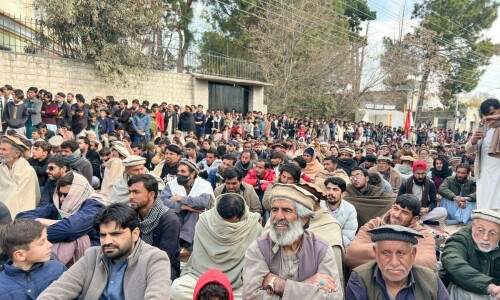• CJP says court has kept cool as ‘justice can’t be dispensed in rage’
• Coalition tells court willing to continue talks with PTI
• Qureshi says no way out, terms govt ‘inflexible’
ISLAMABAD: Chief Justice of Pakistan (CJP) Umar Ata Bandial cautioned on Friday that the court was exercising restraint and that no one should “misunderstand our intentions” but insisted that an “appropriate order” would be issued in the election schedule case.
Though Justice Bandial did not mention or explain what he meant by this, his remarks apparently came against the backdrop of recent anti-judiciary rhetoric by several cabinet members.
“We are also willing to make sacrifices when people are giving sacrifices due to security issues,” he said. “We have kept our cool and chose not to respond to anything since justice cannot be dispensed in rage.”
The chief justice was heading a three-judge bench that had taken up a petition on simultaneous elections to the National and four provincial assemblies on the same date.
As the ruling Pakistan Democratic Movement (PDM) coalition expressed its willingness before the court that it was ready to sit and continue negotiations again, PTI’s Shah Mehmood Qureshi said he saw nothing coming out of the negotiations.
“I regret to say that I am surprised the way our parliamentarians are hurling abuses at the Constitution and the court,” he said, mentioning how even his own party members questioned his loyalty when he earlier agreed to give a break of three days to the PDM during negotiations.
Mr Qureshi also accused the government of pushing the country towards a constitutional crisis and showing no flexibility during the negotiations.
The CJP, however, closed Friday’s proceedings with an observation that an appropriate order would be issued on single-day polls but said the court would take up the matter of its April 4 Punjab polls order in a different hearing.
During the hearing, Justice Bandial, while pointing towards PPP lawyer Farooq H. Naek, regretted that he should appreciate the conduct of the court and compare it with the level with which it was being targeted outside.
He regretted that the government did not want to discuss law but wanted to do politics, adding that earlier it was said politics had entered the judicial process, but “we chose not to respond to politics”.
“We are not politicians and will never answer to politics,” Justice Bandial said and reminded that judges had taken the oath to defend the Constitution at any cost.
Mr Naek tried to emphasise that after the 18th Amendment, elections had to be conducted by the caretaker governments after the dissolution of the assemblies. “Imagine what trouble will be in store for us if the election results are not accepted by the losing side in case a particular party ruled the Punjab and KP,” he said.
However, the chief justice regretted that the government did not take constitutional action seriously. He said the government was on a boycott when the case was being heard at the earlier stage.
The government remained engaged in the 4-3 debate instead of presenting facts before the court, the CJP said. He reminded that even Justice Athar Minallah on one point had suggested restoring Punjab and Khyber Pakhtunkhwa assemblies, but the government was not interested.
He said the government’s seriousness could be gauged from the fact that only the Election Commission of Pakistan (ECP) moved a review petition challenging the April 4 order.
The court, he said, had to act in accordance with the law and the Constitution, adding that the court could have invoked other provisions of the Constitution, but “we desisted from doing it”.
Referring to the government’s contention about the country’s weak financial health, Justice Bandial observed that the court couldn’t close its eyes to the public interest and even couldn’t sit on the outcome of the dialogue if it did not bear fruit.
In view of the constitutional crisis along with ongoing economic, political, social, and security crises, the government and the opposition had to be serious, he said.
Earlier, PML-N’s Khawaja Saad Rafique told the court that his party had been at the receiving end since 2017 and that he was standing today before the court as a victim.
He said both the PTI and the government were sincere in dialogue and it was only a matter of days that a date for simultaneous elections would be decided.
Efforts should be made to insulate Punjab from allegations of dominance over smaller provinces, he said, adding that elections in the presence of a government of a particular party in Punjab and KP would create more bitterness since no one would accept election results.
Earlier, Mr Naek also read out the government’s report on negotiations stating that PTI members were told to avoid further economic deterioration because it was important that the agreement with the IMF was concluded before the annual budget.
Published in Dawn, May 6th, 2023















































Dear visitor, the comments section is undergoing an overhaul and will return soon.